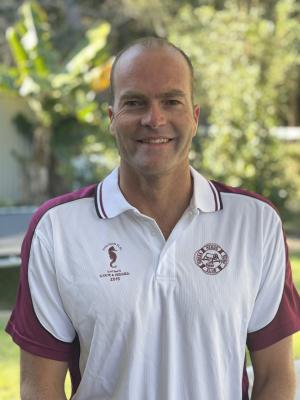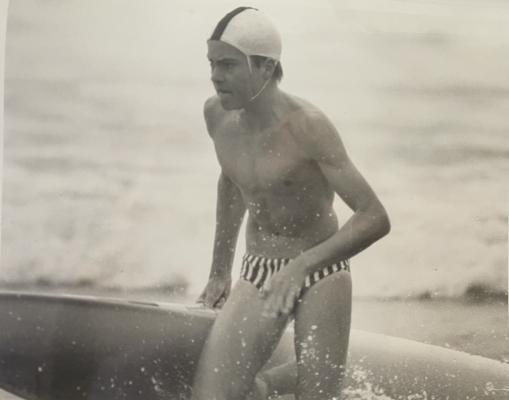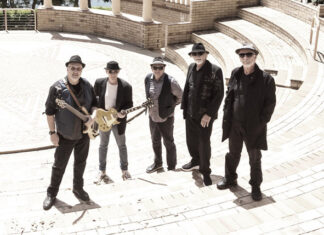It was the last leg of the Olympic decathlon, the 10-event marathon. The 1500m, and a big performance, would earn Australia’s Ash Moloney, the bronze medal, the first time that an Australian would medal in this event. Running slightly behind and to his right, Cedric Dubler, his team mate, friend and training partner of seven years, realised Moloney was starting to drop back. Even his mother, sitting on the bed at home in Logan was screaming, “What are you doing?”
Knowing that he himself was out of medal contention, Dubler put on a surge and, defying a hamstring injury, got right up to his mate’s right shoulder, bent his head forward and began to scream: brutal harsh words of encouragement. Harsh words, that resulted in a sudden surge, earning Moloney that first medal in an Olympic decathlon. However, when asked what his mate said, Moloney replied with a laugh ‘’I don’t think that I could repeat it on television. I could feel his voice bouncing in my cranium like a bat out of hell.” And Dubler said, “I started screaming and got him there.”
How many Olympic medal winners can say that their win was due to a “coach,” running next to them in the final, screaming advice to snap out of it and move. We have all heard stories of coaches, but this must surely rank as the “unexpected.” But it’s the Olympics, after all. Already an Aussie commentator has coined a new phrase, one that could easily slip into that list of great Aussie terminologies. “He was doing a Dubler.” A terminology that could easily come to mean, what all fair dinkum Aussies are guilty of. “Helping a mate in trouble.” Good on yuh mate! This is an incident that will surely live forever in the folklore of Australian sport and mateship.
When we talk about coaches whose work with the very young starts at ground level, another of our quiet achievers, is a young man named Clint Irwin, and his youthful athletes are the boys and girls of surf lifesaving’s Nipper movement. One could say Clint, then a member of the Noosa club, first became serious about sport competition, when competing in the U/15 board race at the Australian Championships at North Wollongong, when he not only won the gold medal, but in doing so became the first member of the Noosa Club, to win an individual gold. It was also the year in which he obtained his bronze medallion.
This was just the start. On moving into the senior ranks, he went on to win Australian gold in the blue ribbon event the Taplin and, following this, the board relay. Then at age 25, while working as a lifeguard at Peregian Beach, he was approached by Peregian senior member Mick Donahue to help train the local nippers in the surf. This, however, was to be the beginning, for following this, he started to work with the nippers at Noosa’s Main Beach. Because of his outstanding success at national level in board competition, he decided to made this his specialty. As a result, many who started as nippers and came up through the ranks, went on to win medals at both state and national titles. Members such as Chantelle Ellis, Rohan Simpson, the McKenzie sisters, Katheryn and Emma, and Caren Black, just to mention a few. Also, in the early days at Noosa, Clint worked in conjunction with Sharlene Kelly as board coach to Lana Rogers. Because the Iron Woman event consists of four legs, swim, ski, board and run, his board coaching was important.
“As the years went on, I found that I really enjoyed the coaching. It is not only the teaching when you get involved (in the nippers) you are also learning from them as well. In the nippers from age 14 on, no two are the same so you have to be flexible, as the journey takes you and them from the very basic, teaching them to stroke, to the elite level where such things as strategy and the finer skills, become of major importance. And most important, you must always remember they are human beings.”
The important role of a good coach in the early years cannot be emphasised enough. It teaches not only how to perform to ones best, but also in a good club, the virtues of mateship, respect for others and good manners. In many clubs we are finding that senior nippers who enjoyed their time, but left because of work, study or family life, are on becoming parents themselves, returning with their little nippers in tow. This is something that coach Irwin stresses. “When this happens to us, it is a good feeling for it makes us understand the importance of what we have done: coaching is not just about winning it is also about life in general.”
To take on the job of coaching, there is in this era, that all-important factor of writing a full and comprehensive program. It is this that will guide the athlete through to the big event. For Sharlene Kelly, coach of the Nutri Grain Iron Woman and Coolangatta Gold champion, Lana Rogers, this is of the utmost importance as it addresses all aspects of the athlete’s fitness. This, said Sharlene, is a must. “It covers all aspects and gives the athlete full confidence, knowing exactly what is required to reach peak condition”
This involves making up a season with all races planned, breaking the season down into phases and cycles. “Every weekend we make up the training plan for the following, depending on the cycle. Lana has a swim coach and a strength and conditioning coach and they plan her sessions around the same training plan we make.” Also, nutrition and recovery, is of the utmost importance. She also has a plan of the calories and macros she must consume each day and this must be done by eating good clean nourishing foods. She also sees a massage and recovery therapist weekly and has ice baths after large training sessions. When not involved in coaching sessions with Lana, Sharlene teaches people how to paddle at Noosa Paddle Sports. “I get a lot of pleasure, helping people of all ages discover the joy of paddling”.
This is just one example of what is required for a coach to take their athlete to the top. Another is to be conscious at all times of their mental health and positive attitude and above all, teach them to believe in themselves. Coaching and supervision can, and often is, a long journey. To be there for the ups and downs is also a major part. Maybe, when people stop and think, it will make them understand why coach Dean Boxall reacted as he did when Ariarne Titmus won the Olympic gold, beating the best in the world. This is not something that the athlete and coach achieve overnight. To all our local coaches, we say many thanks and good luck.
To Kareena Lee, who is home from the Olympics with a bronze medal, your performance in the 10km Open Water Swim has made us all proud .Your effort over the last 100m was truly outstanding. And to that evergreen coach, the legendary John “JR” Rogers, you are sir, in a class of your own.
Keeping abreast of regulations, despite the lockdown being lifted, community sport has a two-week delay, so clubs must await further instructions regarding training and competition. This applies to all codes.









